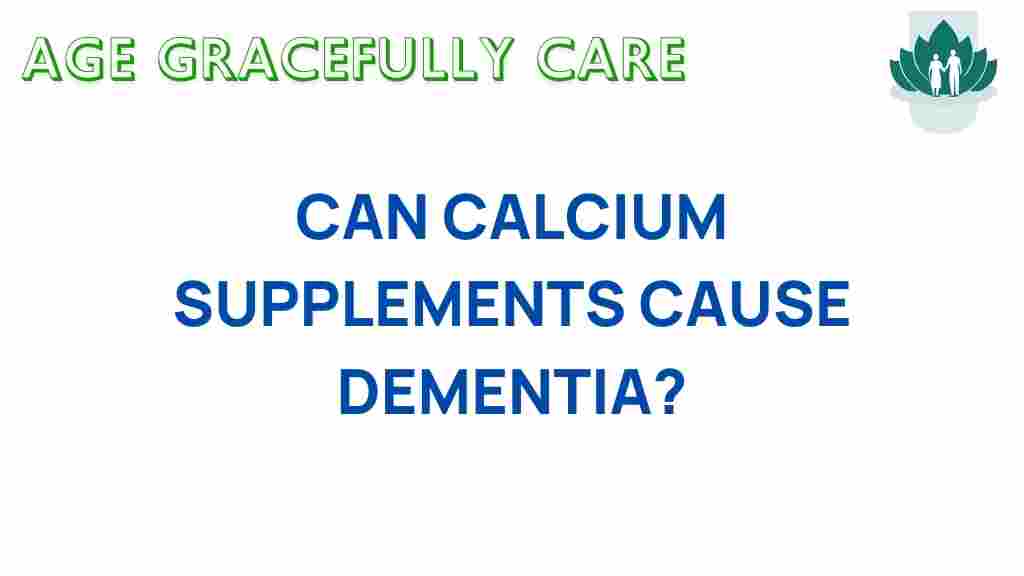Can Calcium Supplements Hold the Key to Dementia Risks?
As we age, the health of our bones and cognitive functions become increasingly important. While many people focus on maintaining bone health through proper nutrition and supplements, recent research suggests that calcium supplements may also play a significant role in reducing the risks associated with dementia. This article explores the relationship between calcium supplements, dementia, and overall health risks, alongside the importance of maintaining cognitive function as we age.
The Importance of Calcium for Bone Health
Calcium is an essential mineral that plays a crucial role in various bodily functions, particularly in maintaining strong bones and teeth. As we age, bone density tends to decrease, leading to a higher risk of fractures and osteoporosis. Calcium supplements can help to mitigate this risk by:
- Enhancing bone density
- Reducing the risk of osteoporosis
- Supporting overall skeletal health
However, the benefits of calcium extend beyond just bone health. Emerging research indicates a potential link between calcium intake and cognitive function, particularly in the context of aging and dementia.
Understanding Dementia and Its Risks
Dementia is an umbrella term that encompasses various cognitive impairments, including memory loss, reasoning difficulties, and changes in personality. As the population ages, the prevalence of dementia is rising, making it a significant public health concern. The main types of dementia include:
- Alzheimer’s disease
- Vascular dementia
- Lewy body dementia
- Frontotemporal dementia
The health risks associated with dementia are profound, not only impacting the individuals diagnosed but also their families and caregivers. Understanding the factors that may influence the development of dementia is critical for prevention strategies.
The Connection Between Calcium Supplements and Cognitive Function
Recent research findings suggest that there may be a connection between calcium intake and cognitive health. Some studies have indicated that adequate calcium levels may help protect against the decline of cognitive function in older adults. Here are some insights from recent research:
- A study published in the journal *Neurology* found that older adults with higher calcium intake had a lower risk of developing dementia.
- Another study indicated that calcium plays a role in neurotransmitter release, which is crucial for memory and learning.
- Calcium’s involvement in cellular signaling may also contribute to maintaining cognitive health.
While these findings are promising, it is essential to approach them with caution. The relationship between calcium supplements and cognitive function is still being explored, and more research is needed to establish definitive conclusions.
Nutrition and Aging: The Role of Calcium
Nutrition plays a pivotal role in aging and can significantly impact both bone health and cognitive function. A well-balanced diet rich in essential nutrients, including calcium, is vital for maintaining overall health as we age. Here are some nutritional strategies to consider:
- Incorporate Calcium-Rich Foods: Foods such as dairy products, leafy greens, and fortified foods can help meet your calcium needs.
- Consider Calcium Supplements: If dietary intake is insufficient, calcium supplements can be an effective way to boost levels.
- Balance Nutrient Intake: Ensure a balanced diet that includes vitamins D and K, which work synergistically with calcium to promote bone health.
By focusing on nutrition, individuals can not only improve their bone health but may also positively influence their cognitive function as they age.
Step-by-Step: How to Incorporate Calcium Supplements into Your Routine
If you are considering adding calcium supplements to your diet to enhance bone health and possibly reduce dementia risks, follow these steps:
- Consult with a Healthcare Provider: Before starting any supplement regimen, it’s essential to discuss your specific health needs and goals with a healthcare professional.
- Choose the Right Supplement: There are various forms of calcium supplements available, such as calcium carbonate and calcium citrate. Your healthcare provider can help you select the most suitable option.
- Determine the Appropriate Dosage: Follow the recommended dosage provided by your healthcare provider, and consider your dietary calcium intake when determining how much to supplement.
- Monitor Your Health: Keep track of any changes in your health or cognitive function after starting the supplement. Regular check-ups can help assess your overall well-being.
- Combine with a Healthy Diet: Ensure that you complement your supplement intake with a diet rich in fruits, vegetables, whole grains, and sources of healthy fats.
Troubleshooting Tips for Calcium Supplement Use
While calcium supplements can be beneficial, some individuals may experience side effects or challenges. Here are some troubleshooting tips:
- Digestive Issues: If you experience constipation or digestive discomfort, consider switching to a different form of calcium (like calcium citrate) or taking it with food.
- Over-Supplementation: Be cautious not to exceed the recommended dosage, as excessive calcium can lead to health issues such as kidney stones.
- Interactions with Medications: Inform your healthcare provider about any medications you are taking, as calcium supplements can interact with certain drugs.
By staying informed and proactive, you can maximize the benefits of calcium supplements while minimizing potential risks.
Conclusion: A Glimmer of Hope in Dementia Prevention
While more research is necessary to fully understand the relationship between calcium supplements and dementia risks, current findings suggest that there may be a potential benefit to incorporating these supplements into your health regimen, especially for aging individuals.
Maintaining bone health through adequate calcium intake is crucial, but it may also have implications for cognitive function and memory retention. As we continue to explore the connections between nutrition, aging, and dementia, calcium supplements can be a valuable component of a holistic approach to health.
For more information on nutrition and cognitive health, visit this resource. Additionally, if you’re looking for specific studies on calcium and dementia, you can check out this research paper.
In conclusion, prioritizing calcium intake—whether through diet or supplements—could play a vital role in promoting not only bone health but also cognitive vitality as we age. Stay informed, consult with healthcare professionals, and take proactive steps towards a healthier future.
This article is in the category Health and created by AgeGracefullyCare Team
